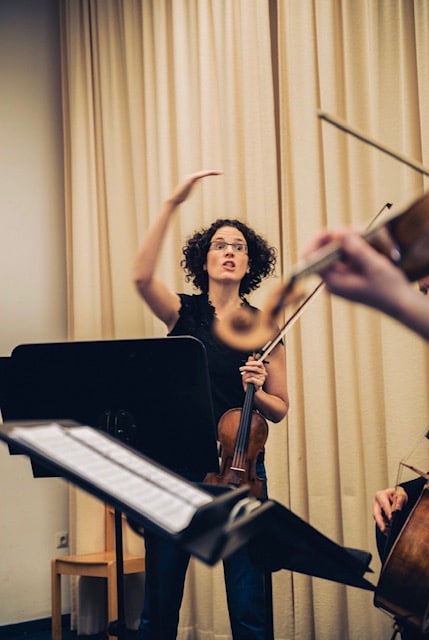From the Lebrecht Album of the Week:
Journalists sometimes write reckless headlines, knowing they will be fish-food in a couple of days. Artists cannot afford that luxury with album titles.
The cover of this one does not reflect the contents, and I’m telling you this so you don’t pester some poor record shop demanding your money back.
The second string quartet by Erich Wolfgang Korngold and the 5 Quartet Pieces of Erwin Schulhoff are about as Yiddish as a bacon croissant. Korngold’s primary influences were Strauss and Puccini, Schulholff was a Dvoravk protégé who wrote musical manifestos for the Communist Party. Both were born into Jewish families but neither of these works exudes a scintilla of Yiddishness, or Yiddishkeit in the vernacular. I suspect both composers would have been horrified to be stamped with that label….
Read on here.

Thirty musicians from the Met Opera, New York Philharmonic, and New York City Ballet will be performing at a rally for the strikers today at 1:30 pm local, conducted by Joseph Alessi.
Catch them in Dante Park directly across from Lincoln Center.
Emma Gerstein, flutist at the Chicago Symphony Orchestra, will speak about her orchestra’s strike since March 10 to protect their pension benefits and regain parity to other leading orchestras across the nation.
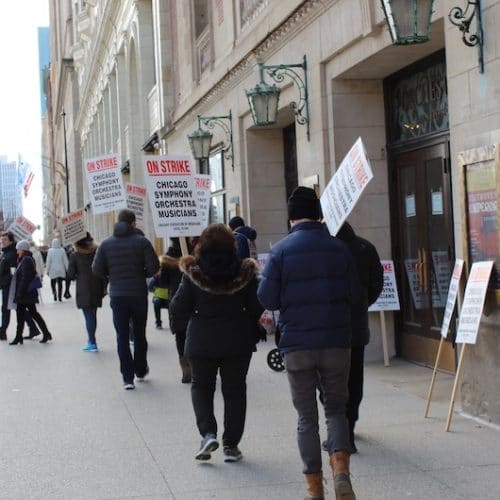
The official version:
Sonya Yoncheva is expecting the birth of her second child in early autumn. Due to the regulations of the Austrian maternity protection laws she will not be allowed to participate in all rehearsals and performances; therefore the artist is no longer able to sing the title role in Luigi Cherubini’s opera Médée in the summer of 2019.
The Salzburg Festival is delighted with Sonya Yoncheva about this personal news, and looks forward to welcoming Ms Yoncheva back to Salzburg in the years ahead.
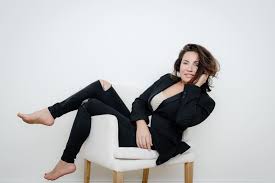
The Russian soprano Elena Stikhina will take over the part of Médée.
This is crazy. If she wants to sing, why should the Austrian nanny state tell her she can’t?
In the course of a lively Twitter colloquium on a thorny topic, the Detroit critic Mark Stryker produced this letter from music director Osip Gabrilowitsch, dated October 1931.
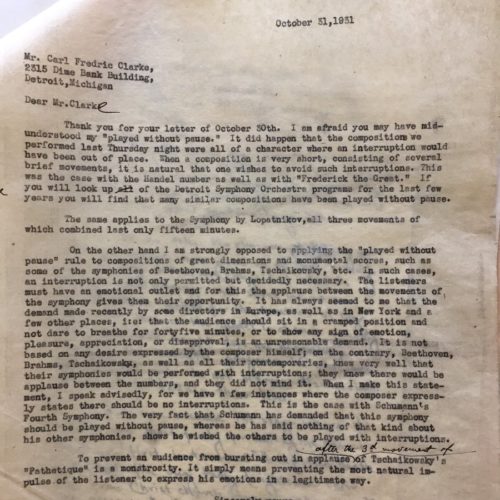
In it, Gabrilowitsch says: ‘It has always seemed to me that the demand made recently by some directors in Europe, as well as in New York and a few other places, i.e. that the audience should sit in a cramped position and not dare to breathe for 45 minutes, or to show any sign of emotion, pleasure appreciation or disapproval, is an unreasonable demand. It is not based on any desire expressed by the composer himself; on the contrary, Beethoven, Brahms, Tchaikovsky as well as all of their contemporaries, knew very well that their symphonies would be performed with interruptions; they knew there would be applause between the numbers, and they did not mind it.’
Gabrilowitsch knew what he was talking about. A friend of Mahler and Rachmaninov, he observed great conductors at work in his career as a concert pianist and he emulated them from 1918 as founding director of the Detroit Symphony. Mark his words.
The debate was triggered by this tweet from Samara Ginsberg:
In 1964, the Bratislava Radio Symphony Orchestra promoted Pavel Farkas to be its concertmaster. He was 24 years old.
Pavel went on to serve as concertmaster for what might be a record number of orchestras – Mexico City Philharmonic, RHK Radio Philharmonic, Osaka Philharmonic, Dutch Radio Philharmonic, Redlands Symphony, Pasadena Pops and the orchestras of the Bolshoi and Joffrey Ballets.
He was founding concermaster of the California Philharmonic and a regular member of the first violins at the LA Phil.
Pavel died last Friday, aged 77.
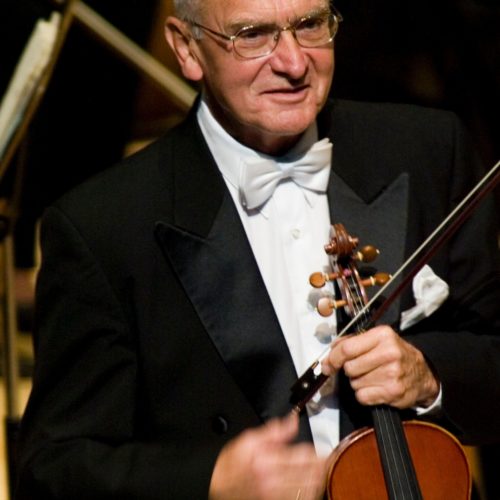
The heroic Aušrinė Stundytė, who was rushed to a Paris hospital for stitches near the end of the second act of Lady Macbeth of Mtsenk this week, has confirmed that she’s ready to sing the role again tomorrow night.
There has been no clarification from the Bastille about the piece of malfunctioning machinery that cut her hand. Singers take to the stage everywhere at their own risk, and especially at the Bastille.
The Opéra has also made the highly dubious offer of half-price tickets for any performance in the run to first-nighters who saw the opera abandoned towards the end of the second act.
That’s really poor customer care.
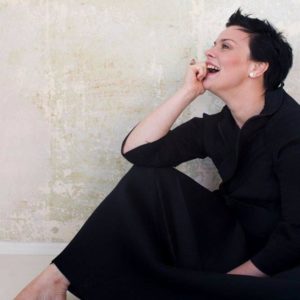
Hannu Lintu has told the Finnish Radio Symphony Orchestra that he will step down at chief conductor in the Spring of 2021, after eight years in the post.
‘The years with the FRSO have been musically rewarding, he said. ‘We have got to know one another extremely well, and this can be heard at every concert. We still have a lot on in the next two seasons: recordings, tours, and above all work to achieve more and more musical milestones. But then it will be time to move on. Renewal is one of the basic conditions for any artist and arts organisation.’
Not a time-server, then.
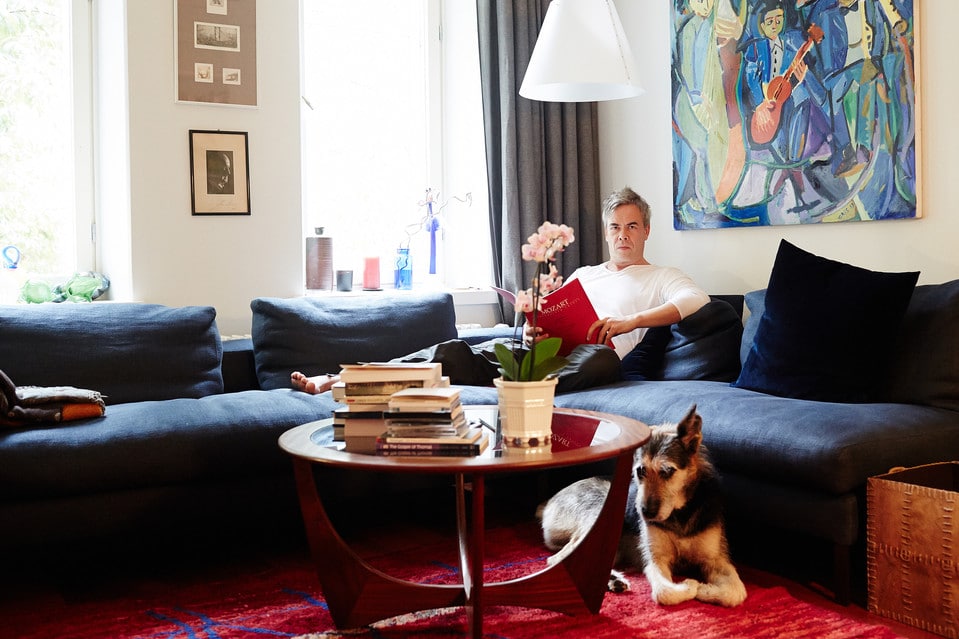
Next season, Lintu will conduct the Detroit, Chicago, Boston and Montreal Symphony orchestras, and in Singapore, Seoul and Tokyo.
Munich has decided on an acoustician for its new concert hall and it’s not Yasuhisa Toyota, the fashionable sound desginer of LA’s Walt Disney Hall, Tokyo’s Suntory Hall and Hamburg’s Elbphilharmonie.
Munich has gone instead to Tateo Nakajima, principal at the British firm Arup, which has a strong presence in Germany.

Nakajima, a protégé of the late Russell Johnson who created the exemplary Birmingham and Lucerne halls, is seen as the anti-Toyota.
The decision is all the more surprising since the Bavarian Radio music director Mariss Jansons spoke up on behalf of Toyota, who has come under pressure lately from singers and auudiences over uneven sound dsitribution at the Elbphilharmonie.
This is a war worth watching.
Building work is scheduled to start in 2021.
Alice Harnoncourt has published a family history left by her husband for their children, replete with many reflections on his 17 years as a front-desk cellist in the Vienna Symphony Orchestra.
His coment above continues: ‘For most conductors, the concert hall is just an arena where they perform masterly dressage as tamers.’
Plus ca change?
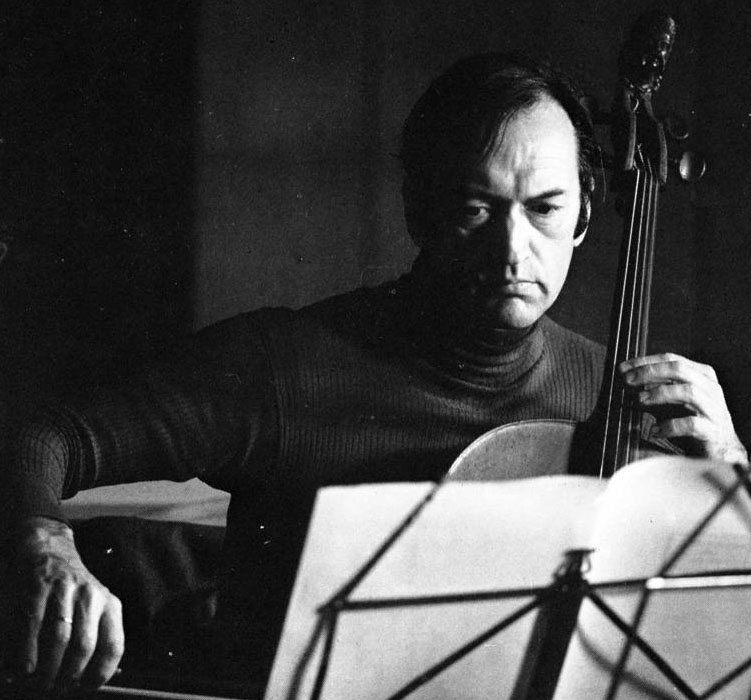
Nikolaus Harnoncourt: Meine Familie. Herausgegeben von Alice Harnoncourt. Residenz-Verlag, Salzburg 2018.
They whisked in Mandy Fredrich from Paris yesterday to sing Marguerite at the opening night of Covent Garden’s Faust.
The intended star, Irina Lungu, had taken ill with flu.
Fredrich, who is German, is presently singing the role in Stuttgart. She landed in London at 15.55 and had just enough time to get costumed up and walk through her entrances before the curtain rose.
It was a close call. And it will not happen again after Brexit.
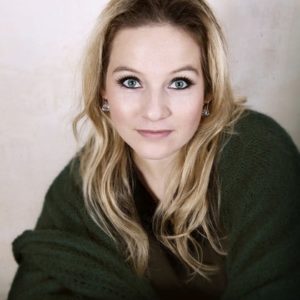
Lungu, as it happens, was only in the role becauzse Diana Damrau had pulled out.
No British soprano was considered.
Here’s Mandy’s version:
it was unbelievable, actually not doable… jumped out of ice, flight to Amsterdam, flight to London, taxi with assistant (Peter, thank you! ) to discuss the concept, 1 hour before the start of the costume, which was finished 1 min before performance.
Ab in die Maske (Babett eine gute Seele!), derweil mit dem Dirigenten Dan Ettinger (tausend Dank!!!) tempi, Striche etc. besprochen, vor jeder Szene mit dem Regieassistenten (Bruno Ravella, fantastisch!!) kurz besprochen, was ich machen soll.
Meine KollegenInnen – vor allem Michael Fabiano, Erwin Schrott und Stéphan Degout – haben mich liebevoll unterstützt und geleitet. Es gab keinen Souffleur!!!!!!!!
I can’t believe what happened yesterday. I’m happy!!!
Our diarist Anthea Kreston finds a spiritual home:
It’s that time of year again for the North American Artemis Quartet Tour, my final tour as a member of this quartet. It is, at it has been before, a cathartic and rejuvenating time for me to reconnect with my culture, check in with old friends, and meet the Slipped Disk Fanclub, which seems to grow with every visit. Montreal, Pittsburgh and now NYC, where I have the gift of time off after the concert before heading to the next location.
Old school friends, colleagues, students, teachers, SD crowd, and the children of old friends. My best friend, who I have known since age 6, is here with me, staying in the hotel and doing NYC things – wandering around aimlessly for hours, going to experimental theater, eating exotic food. Every time I come back, my perspective on my home culture has changed – blurred or sharpened in unexpected ways. I get fiercely sentimental, needing to see the Statue of Liberty, re-reading the Bill of Rights, thinking of my daughters, the youngest now having spent more than half of her life on foreign soil.
Yesterday, a meeting at Eisenberg‘s Sandwich Shop, a greasy-spoon Jewish Deli, I met up with a motley quartet of old acquaintances. This week has been packed with coffee and tea, dinner and breakfast and walking with this person or the other, but the sheer volume of people I want to see in NYC made it necessary to stack people together for meetings, creating a kind of heady mix of humans that a person can find only in NYC.
My best friend, Wanda (not her real name) and I walked downtown to scoop Frank (not real name) up from his place. Meeting us in front would be Clay (you know it). As Wanda and I walked down 7th, heading to a location between Chelsea and the West Village, the blocks became more manicured, dogs smaller, and more velvet hung on the large, antique windows of the well-appointed miniature restaurants. We were there a tad early, and so meandered around a Willian Sonoma, comparing features on espresso machines and le Creuset Dutch ovens with the pretense of having them delivered later today to our penthouse suites. Wanda is a multiple cat-owning, silent-retreat attendee, body-worker/sculptor from Western Mass. She has one of those aroma bubbles around her – ancient oils mixed with incense – I can sometimes swear I can see the scent trail she leaves behind her, a swirling lavender mist. And she is trained in herbs – she makes her own herbal medicines for clients, gathering them in the mountains of Massachusetts and stewing and straining them in her tiny kitchen. If ever an ailment is mentioned, she has the solution – the exotic names of a plant tripping off her tongue with a familiarity of a wizard.
When we rounded the corner, up the block lumbered a purple paisley-shirt wearing young man, entire face obscured by a bushy beard, with a dark cap and tan corduroy blazer, pockets bulging with books. Built like a lumberjack, Clay, in his early 20‘s, is Utah-raised, studying Dramaturgy (with an emphasis on Hungarian Theater) at Columbia. I first met Clay when he was an extremely articulate 6 year-old with a wild imagination – the son of a Jewish presenter from Ogden Utah – whose entire family would become entwined in my own. In fact I had just met up with Clay’s older brother last week in Hamburg, where he is finishing his PhD in Abstract Mathematics.
We headed into the foyer, where we presented ourselves as the entertainment ready to pick up Frank for our brunch meeting. The doorman called up – we would have to return in 10 minutes, Frank wasn’t ready for us yet. Frank, in his mid-30‘s, was one of our chamber music students at Wesleyan University – a terrible cellist, majoring in Religion – he signed up for chamber music every single semester, running through the major works of the repertoire, ability be damned. He was in it for the intellectual and emotional satisfaction, and made it his mission to play everything from the Archduke Trio to Shostakovich 8th String Quartet. After school, he was scooped up by Google before spinning off to a start-up. After going public, he retired (before the age of 30), and has been bumping around the planet, living a hedonistic life and looking for nothing in particular.
We circled the block, and again the doorman said Frank wasn’t ready. I told him I was Frank‘s old Professor, and if he didn’t get his s*** together by the next circling of the block, I was going to go up there, drag him out of bed, and hogtie him. The sun was warm, the sky was clear, and by the next time around the block, we had memorized the locations and characteristics of the various piles of dogshit on the sidewalk, each taking a turn at creatively leaping over or pretending to forget a particular specimen.
And so – we made our way up to Frank‘s gorgeous apartment – he answered the door wet, shirtless, rubbing his head with an impossibly plush towel. Furs draped on the furniture, alternative jazz wafting through the space from invisible surround speakers, and a perfectly displayed bowl of fresh exotic fruits on the table accompanied us as we wandered about, looking at the artwork or marveling at the views of Manhatten, stretched before us on all sides. I poured water, as Frank dressed and introductions were made. We were all standing in his closet, counting his shoes and drinking filtered water from impossibly thin glassware, when he suggested a trip to the deck on top of the building, where the staff was powerwashing the patio furniture.
And so, we headed to Eisenberg‘s, squeezing between the long counter, dotted with occupied swivel stools, and the 2-seaters, finding a 4-top back by the coffee station and bathroom. Latkes, pickles and coffee appeared, followed by pastrami sandwiches and savory matza brei – a mix of matza with fried eggs. We tucked in, taking turns answering Frank‘s direct and probing questions. We learned about Clay‘s home – an unheated garden shed in Brooklyn, with plastic siding, double the width of a twin bed. Built on the the back of a brownstone and illegally rented to him (even so, barely affordable to our young Dramaturg), he drew a map of the room for us – the location of his dresser, coat rack and apple crate in relation to his bed and outlet. It was shorter than he is tall, and so he had to fold entirely in half to tuck into bed. How did he make it through the winter with no heat? He would slide into bed, create enough heat through friction to make a little heat burrito, and be able to mange till morning, when he would roll out and rush to the common bathroom inside the house to warm up, and head to school. After the first cold-wave, he invested in an electric blanket, his warmth traded for the worry of a fire potential in the suspiciously installed outlet. He told us of his studies, interwoven with tales of his successes in the competitive food-eating competition ring (always dip your hotdogs in water before swallowing).
Wanda told us of her struggles with mental health – the years spent in the hospital, the search for balance and tentative security. We listened to recordings of her cats coughing, trying to help with diagnosis, and she showed us the jewelry made from reclaimed bicycle tires which was her recent passion. Frank is the son of two well-known psychiatrists, and was able to relate to Wanda and draw her out in a way I hadn’t seen before.
We had already been at our table for hours, and I had taken my turns with the questions, when we turned to Frank. His childhood spent in boarding school, wasp summer camps, avoiding the Ivys and the pressure towards and avoidance of a life dedicated to investment banking. His start-up – the jockeying for power and predige, the money. The drugs and the sex. São Paolo, the Far East, Porto.
Clay had to rush away – but not before suggesting a great one-man show for us to go to that evening. I paid with Frank‘s actual metal credit card (he said – just sign my name) as he tidied up before heading out to get me some Zink facecream (he thought my skin looked radiant from the audience, but was speechless when he discovered I didn’t have a beauty regimen). Wanda explained that my upkeep amounted to “well my face gets wet when I am in the shower“, as he clutched for the wall in support. I told him how I was embracing my wrinkles, couldn’t wait to go entirely grey. He was disgusted, but patient as he selected the correct products which would (he hoped) reverse some of the damage already done to my skin.
And so – I am rejuvenated – inspired by my friends, their ownership of their paths in life. Fear doesn’t even cross their minds as they follow their hearts, spinning through the world in their own orbits. I suppose I seem every bit as exotic to them as they appeared to me and to each other, and have come out of this day with a freedom, with new ideas for the future – with the knowledge that the next step in my life is bound to be wonderful if I continue to follow my deepest passions and dreams.
